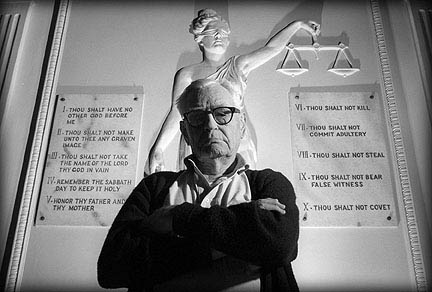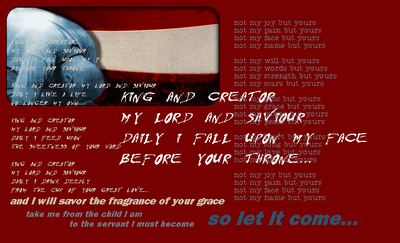a stranger in court

verily i say unto you...
if exclusion is anti-love then hell is the most exclusive club in town.
it is the nightclub with all the lights and none of the warmth of human conversation- a place where everyone is waiting for someone else more interesting to arrive.
it is being utterly alone in a cold crowd and unable to leave, yet aware of a really great house party just across the street
to what degree does the house of God feel like this to the stranger seeking the taste of hope and the sound of love?
***
you know what i find interesting?
this began as a leftover on another blog- a short metaphor about hell with one little line of question at the end for the institutional church- and turned into something else in the comment box.
(http://northvus.blogspot.com/2006/05/chill.html)
In the end though, the ball falls in both courts...people need to walk into a church and not have an invisible "bar" which all churches are expected to meet. they also need to know that things don't happen overnight. -cinder
okay, this was about hell first, BUT if we are going to see the last line as the point, then let's deal with this idyllic 'stranger' at face value...
the stranger at the end is seeking the taste of hope and the sound of love... one earnestly seeking these things has already come to the net in the 'both courts' analogy and is standing with a hand outstretched, not realizing that we shake hands at the end of a game.
this person is new and doesn't know the rules. this person has come more to hook up with some new people, learn a new game and develop some new aspects of his or her character than to actually win anything. here he or she stands looking and feeling a bit socially awkward, and wondering why the people with whom he or she has come to play are always standing outside the court, poised and ready for a serve instead of coming to the net to greet.
honestly? the fact that the newcomer has even found our little tennis club is a pretty amazing thing, considering all the opposition that has been leveled against him or her from everyone in the spiritual realm who sees even the investigation of a tennis match as a threat.
okay, enough analogizing... i'm getting bogged down and i think i have something to say.
we are sometimes guilty of expecting everyone to know everything about this weird environment called 'church' before they get there. it is very unnatural for people to go to a place in order to investigate an ideology or a theology or a whateverology... especially in canada where we have this fear and mistrust of institutions in general and authority figures in particular. introduce an institution like church with its sovereign authority figure (and all the noisy little subordinate ones like me) into the ongoing life-dialogue of a canadian and then see how ready that canadian is to go to a meeting. as cinder was stating, different people do come bringing with them different experiences which inform everything that happens next, colour everything they perceive and prompt their every action.
so this is where the current rhetoric of the 'go-to church' versus the 'come-to church' links up with our social reality. the church needs to go to the people, not expect the people to come to it. (i think that societyVs has said this once or twice in his social gospel of justice and active love, yeah?) the people of the church need to recognize that if their meetings are the only thing that they do on planet earth then they might be falling a little short of the great commission- no matter how high quality their meetings are.
our church is learning this- she is taking a long time because there were a couple decades under a number of different leaders where the status quo was to just flip the switch on the holy tractor beam and suck the seekers into her midst, but she is indeed learning. she is mobilizing. she is initiating. she is engaging. there is hope for her.
but any canadian who comes in the door has already gotten up, chosen clothes, rearranged sunday breakfast/brunch habits, in some cases battled family before during and after battling traffic lights and the clock which brings them ever closer to the eleventh hour (or whatever- you pick the time), found parking and made their way up the steps and through that door... in the face of, along with everything else, the canadian ethos.
they've already come a long way to meet in the middle.
so to what degree, after all that, does the church feel like "the nightclub with all the lights and none of the warmth of human conversation- a place where everyone is waiting for someone else more interesting to arrive"?
that's the ache i feel. just as societyVs was saying in his comments, i pray that when someone does get here that they will actually want to become part of this fellowship. i pray that, having overcome all of that (not to mention countless other spiritual and psychological missiles launched in the spiritual realm) in order to get to a building marked for the purpose of glorifying God, that the meal at the end of the journey and the laughter and warmth around the table reflect God's love and welcome for that person in every way.
but with all this thought about how to get people to come to the church, i am constantly trying to dream up meaningful ways to leave it.
Labels: connection, fellowship, love






